In several messages from seers around the world, Our Lady constantly calls us to remain faithful to the “true Magisterium” of the Church. Just this week again:
Whatever happens, do not depart from the teachings of the true Magisterium of the Church of My Jesus. —Our Lady to Pedro Regis, February 3rd, 2022
My children, pray for the Church and for holy priests that they would always remain faithful to the true Magisterium of the faith. —Our Lady to Gisella Cardia, February 3rd, 2022
Several readers have reached out to us over the past year regarding this phrase wondering what exactly is meant by “the true Magisterium.” Is there a “false Magisterium”? Is this referring to people or a false council, etc.? Others have speculated that it refers to Benedict XVI, and that the papacy of Francis is invalid, etc.
What is the Magisterium?
The Latin word magister means “teacher” from which we derive the word magisterium. The term is used to refer to the teaching authority of the Catholic Church, bestowed on the Apostles by Christ,[1]“Go therefore and make disciples of all nations… teaching them to observe all that I have commanded you” (Matt 28:19-20). St. Paul refers to the Church and her teaching as “the pillar and foundation of truth” (1 Tim. 3:15). and transmitted over the centuries through apostolic succession. The Catechism of the Catholic Church (CCC) states:
The task of giving an authentic interpretation of the Word of God, whether in its written form or in the form of Tradition, has been entrusted to the living teaching office of the Church alone. Its authority in this matter is exercised in the name of Jesus Christ. This means that the task of interpretation has been entrusted to the bishops in communion with the successor of Peter, the Bishop of Rome. —n. 85
The first evidence of this magisterial authority being passed on was when the Apostles chose Matthias to be the successor to Judas Iscariot.
May another take his office. (Acts 1:20)
And as for perpetual tradition, it is evident from all kinds of monuments, and from the most ancient Church history, that the Church has always been governed by bishops, and that the apostles everywhere established bishops. —An Abridgement of Christian Doctrine, 1759 A.D.; reprinted in Tradivox, Vol. III, Ch. 16, pg. 202
Of this teaching authority, the most important point is that a pope and those bishops in communion with him are essentially guardians of the Word of God, of those “traditions that you were taught, either by an oral statement or by a letter of ours” (St. Paul, 2 Thess 2:15).
…this Magisterium is not superior to the Word of God, but is its servant. It teaches only what has been handed on to it. At the divine command and with the help of the Holy Spirit, it listens to this devotedly, guards it with dedication and expounds it faithfully. All that it proposes for belief as being divinely revealed is drawn from this single deposit of faith. —CCC, n. 86
The pope isn’t an absolute sovereign, whose thoughts and desires are law. On the contrary, the ministry of the pope is the guarantor of the obedience toward Christ and His word. —POPE BENEDICT XVI, Homily of May 8, 2005; San Diego Union-Tribune
The Types of Magisterium
The Catechism refers to primarily two aspects of the Magisterium of the apostolic successors. The first is the “ordinary magisterium”. This refers to the ordinary manner in which the Pope and bishops transmit the faith in their daily ministry.
The Roman Pontiff and the bishops are “authentic teachers, that is, teachers endowed with the authority of Christ, who preach the faith to the people entrusted to them, the faith to be believed and put into practice.” The ordinary and universal Magisterium of the Pope and the bishops in communion with him teach the faithful the truth to believe, the charity to practice, the beatitude to hope for. —CCC, n. 2034
Then there is the “extraordinary magisterium” of the Church, which exercises the “supreme degree” of Christ’s authority:
The supreme degree of participation in the authority of Christ is ensured by the charism of infallibility. This infallibility extends as far as does the deposit of divine Revelation; it also extends to all those elements of doctrine, including morals, without which the saving truths of the faith cannot be preserved, explained, or observed. —CCC, n. 2035
Bishops do not, as individuals, exercise this authority, however, ecumenical councils do[2]“The infallibility promised to the Church is also present in the body of bishops when, together with Peter’s successor, they exercise the supreme Magisterium,” above all in an Ecumenical Council.” —CCC n. 891 as well as the Pope when he is infallibly defining truth. What statements of either are considered infallible…
…becomes clear from the nature of the documents, the insistence with which a teaching is repeated, and the very way in which it is expressed. —Congregation for the Doctrine of the Faith, Donum Veritatis n. 24
The teaching authority of the Church is exercised most frequently in magisterial documents such as apostolic letters, encyclicals, etc. And as said previously, when the bishops and Pope are speaking in their ordinary magisterium through homilies, addresses, collegial statements, etc. these are considered magisterial teaching as well, so long as they teach what “has been handed on” (ie. they are not infallible).
There are important caveats, however.
The Limits of the Magisterium
Using the present pontificate as an example…
…if you are troubled by some statements that Pope Francis has made in his recent interviews, it is not disloyalty, or a lack of Romanita to disagree with the details of some of the interviews which were given off-the-cuff. Naturally, if we disagree with the Holy Father, we do so with the deepest respect and humility, conscious that we may need to be corrected. However, papal interviews do not require either the assent of faith that is given to ex cathedra statements or that internal submission of mind and will that is given to those statements that are part of his non-infallible but authentic magisterium. —Fr. Tim Finigan, tutor in Sacramental Theology at St John’s Seminary, Wonersh; from The Hermeneutic of Community, “Assent and Papal Magisterium”, October 6th, 2013; http://the-hermeneutic-of-continuity.blogspot.co.uk
So what about current affairs? Does the Church have any business addressing these?
To the Church belongs the right always and everywhere to announce moral principles, including those pertaining to the social order, and to make judgments on any human affairs to the extent that they are required by the fundamental rights of the human person or the salvation of souls. —CCC, n. 2032
And again,
Christ endowed the Church’s shepherds with the charism of infallibility in matters of faith and morals. CCC, n. 80
What the Church does not have the authority to do is pronounce authoritatively on necessarily the best way to conduct affairs pertaining to the social order. Take the matter of “climate change”, for instance.
Here I would state once more that the Church does not presume to settle scientific questions or to replace politics. But I am concerned to encourage an honest and open debate so that particular interests or ideologies will not prejudice the common good. —POPE FRANCIS, Laudato si’, n. 188
…The Church has no particular expertise in science… the Church has got no mandate from the Lord to pronounce on scientific matters. We believe in the autonomy of science. —Cardinal Pell, Religious News Service, July 17th, 2015; relgionnews.com
On the matter of whether one is morally obliged to take a vaccine, here too, the Church can only provide a moral guiding principle. The actual medical decision to take an injection is a matter of personal autonomy that has to take into consideration the risks and benefits. Hence, the Congregation for the Doctrine of the Faith (CDF) explicitly states:
…all vaccinations recognized as clinically safe and effective can be used in good conscience…At the same time, practical reason makes evident that vaccination is not, as a rule, a moral obligation and that, therefore, it must be voluntary… In the absence of other means to stop or even prevent the epidemic, the common good may recommend vaccination…— “Note on the morality of using some anti-Covid-19 vaccines”, n. 3, 5; vatican.va; a “recommendation” is not the same as an obligation
Hence, when Pope Francis gave a television interview stating…
I believe that morally everyone must take the vaccine. It is the moral choice because it is about your life but also the lives of others. I do not understand why some say that this could be a dangerous vaccine. If the doctors are presenting this to you as a thing that will go well and doesn’t have any special dangers, why not take it? There is a suicidal denialism that I would not know how to explain, but today, people must take the vaccine. —POPE FRANCIS, interview for Italy’s TG5 news program, January 19th, 2021; ncronline.com
this could be a dangerous vaccine. If the doctors are presenting this to you as a thing that will go well and doesn’t have any special dangers, why not take it? There is a suicidal denialism that I would not know how to explain, but today, people must take the vaccine. —POPE FRANCIS, interview for Italy’s TG5 news program, January 19th, 2021; ncronline.com
…he was voicing a personal opinion that is not binding on the faithful, as he steps very quickly outside of his ordinary magisterium. He is neither a doctor nor a scientist with the authority to declare (especially at the beginning of the drug rollout) that these injections are without “special dangers” or that the lethality of the virus was such that one was obliged.[3]World-renowned bio-statistician and epidemiologist, Prof. John Iannodis of Standford University, published a paper on the infection fatality rate of COVID-19. Here are the age-stratified statistics:
0-19: .0027% (or a survival rate of 99.9973%)
20-29 .014% (or a survival rate of 99.986%)
30-39 .031% (or a survival rate of 99.969%)
40-49 .082% (or a survival rate of 99.918%)
50-59 .27% (or a survival rate of 99.73%)
60-69 .59% (or a survival rate of 99.31%) (Source: medrxiv.org) On the contrary, the data has proven him tragically wrong.[4]cf. The Tolls; Francis and the Great Shipwreck
Here is a clear case whereby the “true Magisterium” does not apply. If Pope Francis gives a weather forecast or supports one political solution over another, one is not necessarily bound to his personal opinion. Another example was Francis’ endorsement of the Paris climate accord.
Dear friends, time is running out! …A carbon pricing policy is essential if humanity wants to use the resources of creation wisely… the effects on the climate will be catastrophic if we exceed the 1.5ºC threshold outlined in the Paris Agreement goals. —POPE FRANCIS, June 14th, 2019; Brietbart.com
Is a carbon tax the best solution? What about spraying the atmosphere with particulates, as some scientists are proposing? And is a catastrophe actually upon us (according to Greta Thunberg, the world will implode in about six years.[5]huffpost.com ) Despite what the media tells you, there is not a consensus;[6]cf. Climate Confusion and Climate Change and the Great Delusion many climate experts and renowned scientists absolutely refute both the climate and pandemic hysterics that the Pope has wholesale embraced. Based on their expertise, they are fully within their rights to respectfully disagree with the Pope.[7]Case in point: St. John Paul II once warned about “ozone depletion” [see World Day of Peace, January 1st, 1990; vatican.va] the new hysteria of the 90’s. However, the “crisis” passed and is considered now to be a natural cycle observed long before now-banned “CFCs”’ used as a refrigerant were even used, and that this may have been a scheme to make professional environmentalists and chemical companies rich. Ah, some things never change.
Climate change has become a powerful political force for many reasons. First, it is universal; we are told everything on Earth is threatened. Second, it invokes the two most powerful human motivators: fear and guilt… Third, there is a powerful convergence of interests among key elites that support the climate “narrative.” Environmentalists spread fear and raise donations; politicians appear to be saving the Earth from doom; the media has a field day with sensation and conflict; science institutions raise billions in grants, create whole new departments, and stoke a feeding frenzy of scary scenarios; business wants to look green, and get huge public subsidies for projects that would otherwise be economic losers, such as wind farms and solar arrays. Fourth, the Left sees climate change as a perfect means to redistribute wealth from industrial countries to the developing world and the UN bureaucracy. —Dr. Patrick Moore, Ph.D., co-founder of Greenpeace; “Why I am a Climate Change Skeptic”, March 20th, 2015; Heartland
Given how global leaders have explicitly stated that “climate change” and “COVID-19” are being used precisely to redistribute wealth (ie. neo-Communism with a green hat) through a “Great Reset“, the Pope has arguably been dangerously misled, to the point where he has made many feel they are morally obligated to take an injection that is now demonstrably killing hundreds of thousands of people and injuring millions more.[8]cf. The Tolls
…it is important to note that the competency of such leaders resides in matters pertaining to “faith, morals and Church discipline”, and not in the fields of medicine, immunology or vaccines. Insofar as the four aforesaid criteria[9] (1) the vaccine would have to present no ethical objections at all in its development; 2) it would have to be certain in its effectiveness; 3) it would have to be safe beyond doubt; 4) there would have to be no other options to protect oneself and others against the virus. have not been met, ecclesial statements on vaccines do not constitute Church teaching and are not morally binding to the Christian faithful; rather, they constitute “recommendations”, “suggestions”, or “opinions”, as they are beyond the purview of ecclesial competency. —Rev. Joseph Iannuzzi, STL, S. Th.D., Newsletter, Fall 2021
It must be said that popes can and do make mistakes. Infallibility is reserved ex cathedra (“from the seat” of Peter). No popes in the history of the Church have ever made ex cathedra errors — a testament to Christ’s promise: “When the Spirit of truth comes, he will guide you into all the truth.” [10]John 16:13 Following “the true Magisterium”, then, does not mean assenting to every word out of a bishop or pope’s mouth but only that which lies within their authority.
Recently in his general audience, Pope Francis stated:
…let’s think about those who have denied the faith, who are apostates, who are the persecutors of the Church, who have denied their baptism: Are these also at home? Yes, these too. All of them. The blasphemers, all of them. We are brothers. This is the communion of saints. —February 2nd, catholicnewsagency.com
These comments, on their face, appear to be a contradiction of Church teaching and our clear ability to lose communion with both God and the saints through sin, much less a deliberate renunciation of our baptism. Father Roch Kereszty, a Cistercian monk and retired University of Dallas theology professor, was quick to note that this was “a fatherly exhortation, not a binding document.” In other words, even mistakes can be made in the ordinary magisterium of the Pope that require future clarification, which Fr. Kereszty attempts,[11]catholicnewsagency.com or even fraternal correction from fellow bishops.
And when Cephas came to Antioch, I opposed him to his face because he clearly was wrong… when I saw that they were not on the right road in line with the truth of the gospel, I said to Cephas in front of all, “If you, though a Jew, are living like a Gentile and not like a Jew, how can you compel the Gentiles to live like Jews?” (Gal 2:11-14)
And hence,
…as the Church’s one and only indivisible magisterium, the pope and the bishops in union with him carry the gravest responsibility that no ambiguous sign or unclear teaching comes from them, confusing the faithful or lulling them into a false sense of security. —Gerhard Ludwig Cardinal Müller, former Prefect of the Congregation for the Doctrine of the Faith; First Things, April 20th, 2018
The Dangers We Face
There is currently a great deal of tension and division in the Church, not only on the current pandemic, but also regarding the teachings of the Church. While issues of bodily health are important, I believe Our Lady is most concerned with issues of the soul.
For instance, one of the key Cardinals at the upcoming Synod has proposed that homosexual acts no longer be considered as sin.[12]catholicculture.org This is a clear departure from 2000 years of magisterial teaching on “faith and morals” and not part of “the true Magisterium.” It is these kinds of changes being proposed by this Cardinal and several German bishops that is precisely what Our Lady has called us to reject and not follow.
Another danger is the continuing murmuring suggesting that Pope Francis’s election was invalid. Some have tried to debate that the so-called “St. Gallen’s Mafia”, formed during Benedict’s election, but disbanded during Francis’, was active in influencing the outcome of either election in such a way as to canonically invalidate the process (see Was Pope Francis’s Election Invalid?). Others have said that Benedict’s resignation was not worded correctly in the Latin, and therefore, he remains the true pope. As such, they argue, Benedict represents “the true Magisterium” of the Church. But these arguments have waded into minutiae that would likely require a future council or pope to resolve if there was any merit to their arguments in the first place. I will simply conclude with two points on this.
The first is that not a single cardinal who voted in the conclaves, including the most “conservative”, has even so much as hinted that either election was invalid.
The second is that Pope Benedict has explicitly and repeatedly stated what his intentions were:
There is absolutely no doubt regarding the validity of my resignation from the Petrine ministry. The only condition for the validity of my resignation is the complete freedom of my decision. Speculations regarding its validity are simply absurd… [My] last and final job [is] to support [Pope Francis’] pontificate with prayer. —POPE EMERITUS BENEDICT XVI, Vatican City, Feb. 26th, 2014; Zenit.org
 And again, in Benedict’s autobiography, papal interviewer Peter Seewald explicitly asks whether the retired Bishop of Rome was the victim of ‘blackmail and conspiracy.’
And again, in Benedict’s autobiography, papal interviewer Peter Seewald explicitly asks whether the retired Bishop of Rome was the victim of ‘blackmail and conspiracy.’
That’s all complete nonsense. No, it’s actually a straight-forward matter… no one has tried to blackmail me. If that had been attempted I would not have gone since you are not permitted to leave because you’re under pressure. It’s also not the case that I would have bartered or whatever. On the contrary, the moment had—thanks be to God—a sense of having overcome the difficulties and a mood of peace. A mood in which one really could confidently pass the reins over to the next person. —Benedict XVI, Last Testament in His Own Words, with Peter Seewald; p. 24 (Bloomsbury Publishing)
So intent are some to dethrone Francis that they are willing to suggest that Pope Benedict is simply lying here—a virtual prisoner in the Vatican. That rather than lay down his life for the truth and Christ’s Church, Benedict would prefer to either save his own hide, or at best, protect some secret that would do more damage. But if that were the case, the aged Pope Emeritus would be in grave sin, not only for lying, but for publicly supporting a man whom he knows to be, by default, an antipope. Far from secretly saving the Church, Benedict would be placing her in grave danger.
On the contrary, Pope Benedict was very clear in his last General Audience when he resigned the office:
I no longer bear the power of office for the governance of the Church, but in the service of prayer I remain, so to speak, in the enclosure of Saint Peter. —February 27th, 2013; vatican.va
Once again, eight years later, Benedict XVI affirmed his resignation:
It was a difficult decision but I made it in full conscience, and I believe I did well. Some of my friends who are a bit ‘fanatical’ are still angry; they did not want to accept my choice. I am thinking about the conspiracy theories which followed it: those who said it was because of the Vatileaks scandal, those who said it was because of the case of the conservative Lefebvrian theologian, Richard Williamson. They did not want to believe it was a conscious decision, but my conscience is clear. —February 28th, 2021; vaticannews.va
This is all to say that we could have a pope, as we have had in the past, who sells his papacy, fathers children, increases his personal wealth, abuses his privileges, and misuses his authority. He could appoint modernists to major posts, Judases to sit at his table, and even Lucifer to the Curia. He could dance naked on the Vatican walls, tattoo his face, and project animals onto the facade of St. Peter’s. And all of this would create a ruckus, upheaval, scandal, division, and sorrow upon sorrow. And it would test the faithful as to whether or not their faith is in man, or in Jesus Christ. It would test them to wonder if Jesus really meant what He promised—that the gates of hell would not prevail against His Church, or whether Christ, too, is a liar.
It would test them as to whether they would still follow the true Magisterium, even at the cost of their lives.
Mark Mallett is the author of The Now Word and The Final Confrontation and a cofounder of Countdown to the Kingdom.
Related Reading
On who has the authority to interpret Scripture: The Fundamental Problem
On the primacy of Peter: The Chair of Rock
On Sacred Tradition: The Unfolding Splendor of Truth
Footnotes
| ↑1 | “Go therefore and make disciples of all nations… teaching them to observe all that I have commanded you” (Matt 28:19-20). St. Paul refers to the Church and her teaching as “the pillar and foundation of truth” (1 Tim. 3:15). |
|---|---|
| ↑2 | “The infallibility promised to the Church is also present in the body of bishops when, together with Peter’s successor, they exercise the supreme Magisterium,” above all in an Ecumenical Council.” —CCC n. 891 |
| ↑3 | World-renowned bio-statistician and epidemiologist, Prof. John Iannodis of Standford University, published a paper on the infection fatality rate of COVID-19. Here are the age-stratified statistics:
0-19: .0027% (or a survival rate of 99.9973%) |
| ↑4 | cf. The Tolls; Francis and the Great Shipwreck |
| ↑5 | huffpost.com |
| ↑6 | cf. Climate Confusion and Climate Change and the Great Delusion |
| ↑7 | Case in point: St. John Paul II once warned about “ozone depletion” [see World Day of Peace, January 1st, 1990; vatican.va] the new hysteria of the 90’s. However, the “crisis” passed and is considered now to be a natural cycle observed long before now-banned “CFCs”’ used as a refrigerant were even used, and that this may have been a scheme to make professional environmentalists and chemical companies rich. Ah, some things never change. |
| ↑8 | cf. The Tolls |
| ↑9 | (1) the vaccine would have to present no ethical objections at all in its development; 2) it would have to be certain in its effectiveness; 3) it would have to be safe beyond doubt; 4) there would have to be no other options to protect oneself and others against the virus. |
| ↑10 | John 16:13 |
| ↑11 | catholicnewsagency.com |
| ↑12 | catholicculture.org |

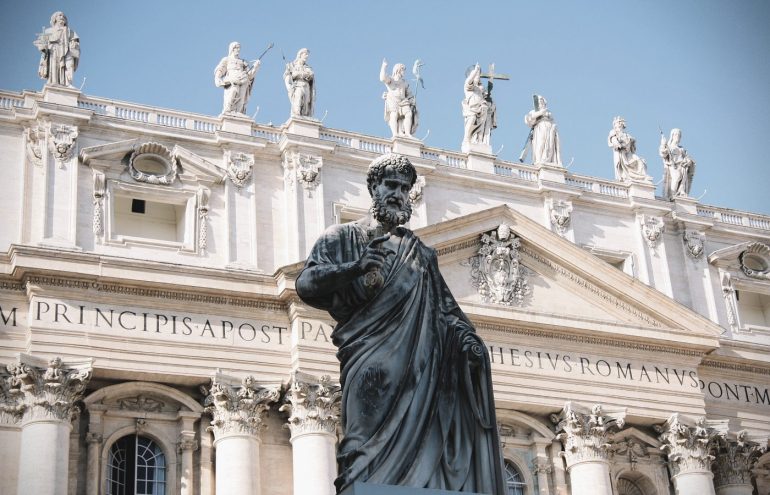

 Alicja Lenczewska
Alicja Lenczewska

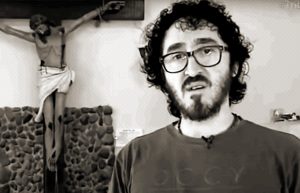
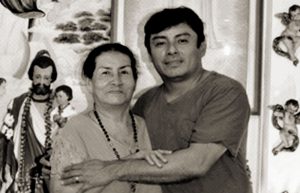
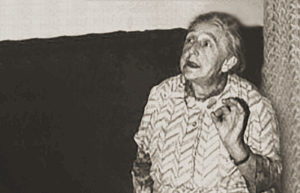 Elizabeth Kindelmann
Elizabeth Kindelmann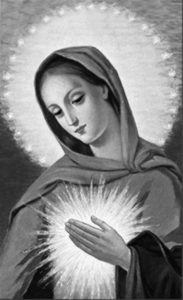 Through what became The Spiritual Diary, Jesus and Mary taught Elizabeth, and they continue to instruct the faithful in the divine art of suffering for the salvation of souls. Tasks are assigned for each day of the week, which involve prayer, fasting, and night vigils, with beautiful promises attached to them, laced with special graces for priests and the souls in purgatory. In their messages, Jesus and Mary say that The Flame of Love of the Immaculate Heart of Mary is the greatest grace given to mankind since the Incarnation. And in the not-so-distant future, her flame will engulf the entire world.
Through what became The Spiritual Diary, Jesus and Mary taught Elizabeth, and they continue to instruct the faithful in the divine art of suffering for the salvation of souls. Tasks are assigned for each day of the week, which involve prayer, fasting, and night vigils, with beautiful promises attached to them, laced with special graces for priests and the souls in purgatory. In their messages, Jesus and Mary say that The Flame of Love of the Immaculate Heart of Mary is the greatest grace given to mankind since the Incarnation. And in the not-so-distant future, her flame will engulf the entire world.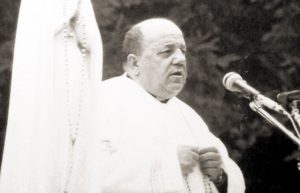 Father Stefano Gobbi
Father Stefano Gobbi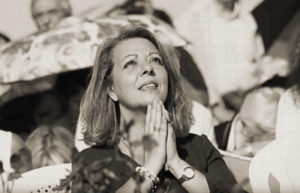 Why Gisella Cardia?
Why Gisella Cardia?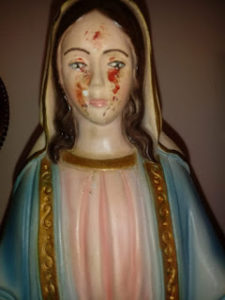 Thirdly, the messages have frequently been accompanied by visible phenomena, photographic evidence found in In Cammino con Maria, which cannot be the fruit of subjective imagination, notably the presence of the stigmata on Giselle’s body and and the appearance of crosses or religious texts in blood on Gisella’s arms. See the pictures taken from her apparition website
Thirdly, the messages have frequently been accompanied by visible phenomena, photographic evidence found in In Cammino con Maria, which cannot be the fruit of subjective imagination, notably the presence of the stigmata on Giselle’s body and and the appearance of crosses or religious texts in blood on Gisella’s arms. See the pictures taken from her apparition website 
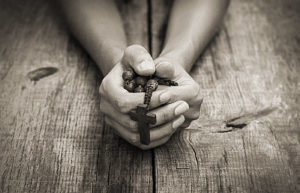 Jennifer
Jennifer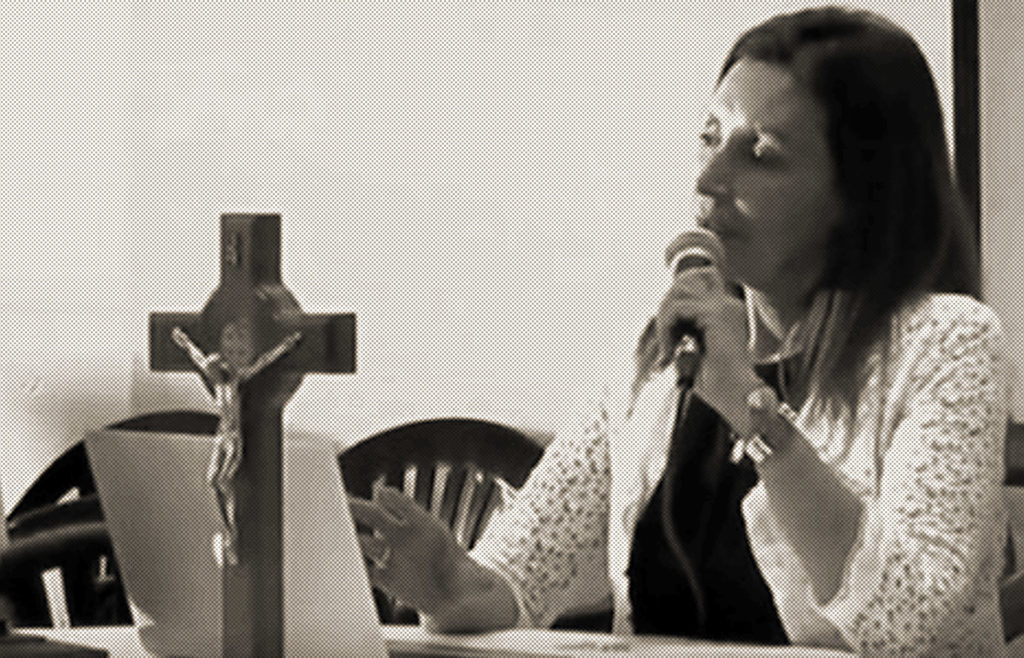
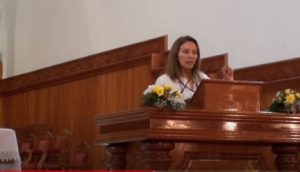
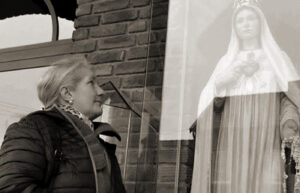 Why Manuela Strack?
Why Manuela Strack?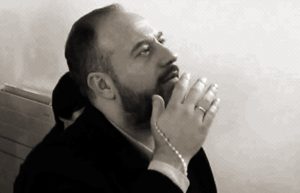

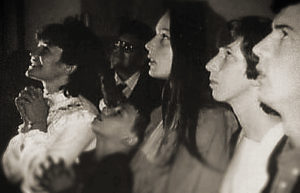 Why the Visionaries of Our Lady of Medjugorje?
Why the Visionaries of Our Lady of Medjugorje?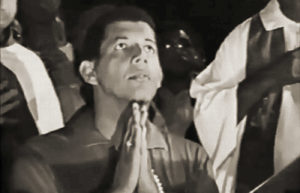 Why Pedro Regis?
Why Pedro Regis?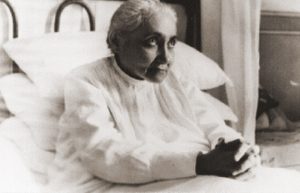 Why the Servant of God Luisa Piccarreta?
Why the Servant of God Luisa Piccarreta? of the saints. It wasn’t until she became a “Daughter of Mary” that the nightmares finally ceased at the age of eleven. In the following year, Jesus began to speak interiorly to her especially after receiving Holy Communion. When she was thirteen, He appeared to her in a vision that she witnessed from the balcony of her home. There, in the street below, she saw a crowd and armed soldiers leading three prisoners; she recognized Jesus as one of them. When He arrived beneath her balcony, He raised his head and cried out: “Soul, help Me!” Deeply moved, Luisa offered herself from that day on as a victim soul in expiation for the sins of mankind.
of the saints. It wasn’t until she became a “Daughter of Mary” that the nightmares finally ceased at the age of eleven. In the following year, Jesus began to speak interiorly to her especially after receiving Holy Communion. When she was thirteen, He appeared to her in a vision that she witnessed from the balcony of her home. There, in the street below, she saw a crowd and armed soldiers leading three prisoners; she recognized Jesus as one of them. When He arrived beneath her balcony, He raised his head and cried out: “Soul, help Me!” Deeply moved, Luisa offered herself from that day on as a victim soul in expiation for the sins of mankind. immobile, rigid-like state that appeared almost as if she were dead. It was only when a priest made the sign of the Cross over her body that Luisa regained her faculties. This remarkable mystical state persisted until her death in 1947—followed by a funeral that was no little affair. During that period in her life, she suffered no physical illness (until she succumbed to pneumonia at the end) and she never experienced bedsores, despite being confined to her little bed for sixty-four years.
immobile, rigid-like state that appeared almost as if she were dead. It was only when a priest made the sign of the Cross over her body that Luisa regained her faculties. This remarkable mystical state persisted until her death in 1947—followed by a funeral that was no little affair. During that period in her life, she suffered no physical illness (until she succumbed to pneumonia at the end) and she never experienced bedsores, despite being confined to her little bed for sixty-four years.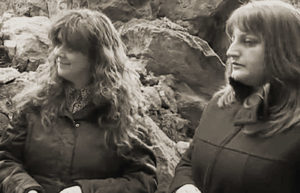 Why Simona and Angela?
Why Simona and Angela?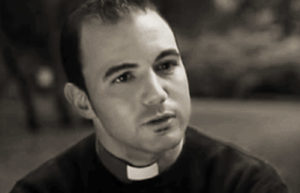
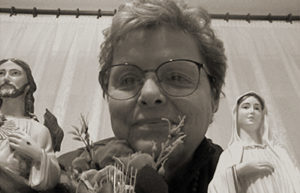 Valeria Copponi
Valeria Copponi